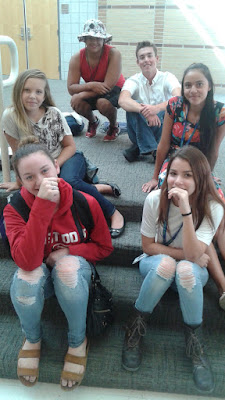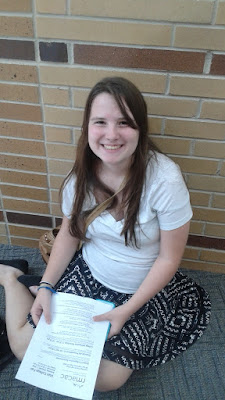- College Websites
- If you are thinking about a specific college--check out their scholarships as early as possible. They might use the "Index" for Academic Scholarships, and it can help to have a specific goal for GPA & ACT if you know there is $$$$$ waiting at the end
- Colleges not only have academic scholarships--but also leadership, financial need, ambassador programs, and department scholarships.
- Scholarships given by a university must be used AT that university, but if a university or college is on your possible go-to list, then you should apply for every possible scholarship they disburse!
- Use Pinterest to find all sorts of scholarships, as well as tips on how to effectively complete the scholarship applications
- Type in simple search terms "college" or "scholarships". Start there, and as you find things you like, add them to a folder for future reference
- Pinterest is linked with one blogger that posts scholarships for each month. I type in "January scholarships" or "February scholarships", and a list specific to each month comes up!
- This is as simple as it gets! Use this to find scholarships for the coming month, apply, then repeat each month!
- Use the websites, blogs, and resources you have found! Read them, follow the directions, and
- Have the XCel Spreadsheet up at the same time and flip between the two screens to get all the information from Pinterest on to your own Personal Scholarship XCel Spreadsheet
- Use Google.
- Use different search terms to yield different results. Type in "scholarships for high school students" or "scholarships without GPA requirement"
- Again--have the XCel Spreadsheet up at the same time and flip between the two screens--adding information about scholarships onto the XCel Spreadsheet
- Use Scholarship Engines
- Read about 20 of the best scholarship search engines here. Don't be afraid to use a few different ones, because they all have different strengths.
- Don't mistake a "scholarship search engine" for "completing a scholarship application". You still have to actually fill out the application yourself!
- Use the "The Ultimate Scholarship Book 2017" by Tanabe. They come out with one every year--and every year it's a great resource to look for scholarships based on areas of study and interest.
- We have copies of this book in the library--use them! Of course you can buy your own, but if you don't know if you'll use it, start with the library copy. Spend a few hours and become familiar with it, and then you can decide if you'd like your own copy of the biggest Scholarship Book available.
So...that's how you FIND scholarships. But as I said before, if you don't actually apply, you're at the same spot as before. Sure, you're more informed, but your bank account is still holding the same amount of dough. So, how to actually apply for scholarships? Read on.
- Do you have your XCel Spreadsheet of scholarships? If not, just email Mrs. Krim at krim.scholarship@gmail.com to request it. It's a basic template to fill in with your own scholarships.
- Fill in the XCel Spreadsheet with scholarships--don't be afraid to put down a scholarship for a later year! In fact, that is EXACTLY what you should do! Include all scholarships that you'd like to aim for--even if they are 1, 2 or even 4 or more years out.
- I would suggest making one tab for High School Scholarships, and one tab for College Scholarships. But besides that, don't be overly concerned whether it is for any specific grade in high school at this point. You'll organize them later. This step is just about finding scholarships.
- Once you've filled in the XCel Organizing Scholarships Spreadsheet with a minimum of 10 scholarships, organize them according to grade and date.
- Start on the scholarship that is open now! Don't wait for the due date!
- One way that helps students complete the scholarship application is if they have an actual checkoff list. You can use the checkoff list on the XCel sheet, or write an actual checklist for each scholarship (sometimes a paper checklist posted where you work on it daily is most helpful)
- Don't skip the "final review". This is where you double check that you have ALL the material, documents, essays, and information for the application.
- If you are missing one thing, they will automatically eliminate your application. It doesn't matter how great your essay is--if you forgot the transcript--you're out of the running. Be sure to go through this "final review" at least 2 weeks before the due date to allow yourself time if you forgot something.
- Once everything is completed, submit your application. Most scholarship applications are now online--so be sure that it's 100% before you hit "submit".
- If you are completing an application that is still paper-and-pen and mailed in, be sure to read the fine print: some applications must be RECEIVED by the due date, others simply have to be postmarked. Make sure you know which one to do--and do it!












